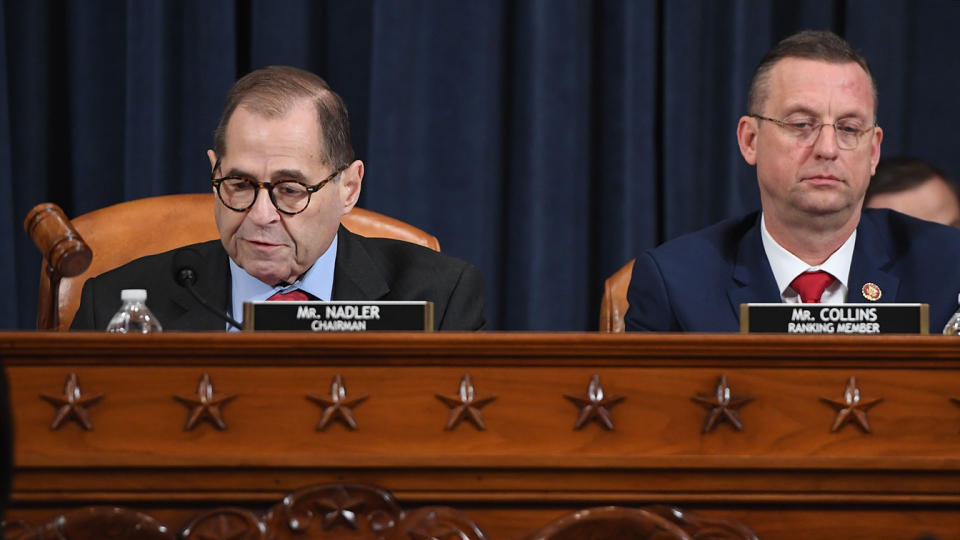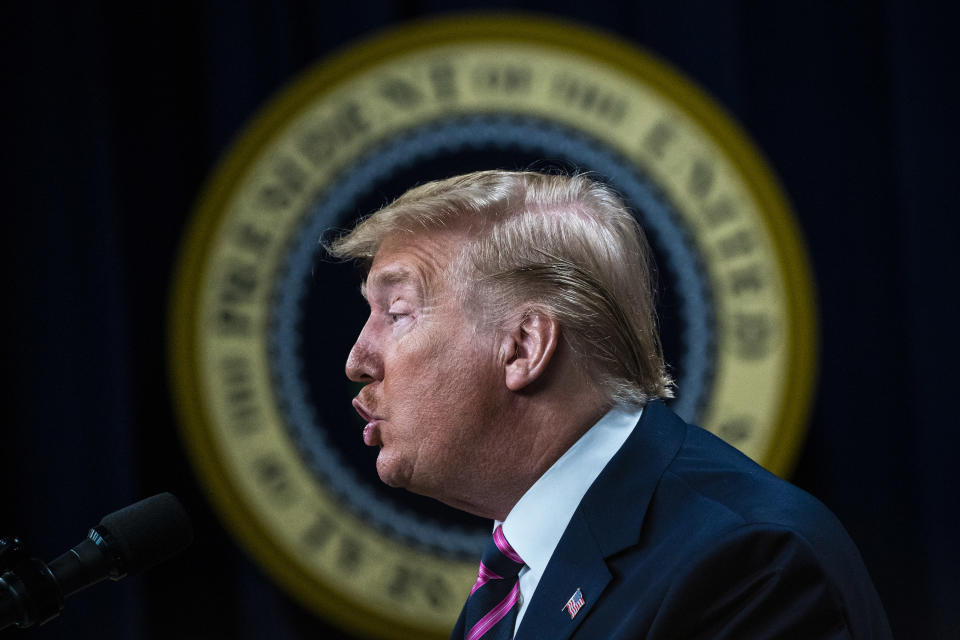Articles of impeachment advanced in historic House vote
WASHINGTON — For the first time in two decades, the House Judiciary Committee has advanced articles of impeachment against a sitting president, charging Donald Trump with abusing power and hindering a congressional investigation into that alleged abuse.
Both articles have to do with the pressure campaign over the summer in the Ukrainian capital of Kyiv, instigated at the president’s request and intended to hurt his political rivals. “In all of this,” the articles of impeachment read, “President Trump has acted in a manner contrary to his trust as a president and subversive of constitutional government, to the great prejudice of the cause of law and justice, and to the manifest injury of the people of the United States.”
Since the Judiciary Committee is controlled by Democrats, who won back the House of Representatives in the 2018 midterm elections, Friday’s vote was of little surprise. Both articles received a 23-17 vote, with no defections by either Democrats or Republicans. (One Democrat, Rep. Ted Lieu of California, missed the vote because he had just undergone heart surgery.)
The legislators offered their voice votes in grim tones, with some Republicans adding a note of anger. A somber Rep. Jerry Nadler, the chairman of the committee, adjourned the meeting immediately after the second vote.

The full House is expected to vote on the articles of impeachment next Wednesday. That vote will also likely be along party lines, with no Republicans expected to vote for impeachment and perhaps two or three Democrats possibly voting against referring the charges to the Senate. (Two Democrats who had been elected in pro-Trump districts voted against opening the inquiry in late October, with Republicans celebrating their defections.)
If the vote was predictable, it was still historic. It was the first congressional vote on articles of impeachment since 1998, when the same committee — with some of the same members — voted to endorse four articles of impeachment against President Bill Clinton, who stood accused of committing perjury and obstructing justice in the inquiry into his extramarital affair with White House intern Monica Lewinsky.
That impeachment, like this one, was a bitterly partisan affair. One Democrat compared the impeachment, on the day of the House Judiciary vote in 1998, to “a runaway train headed for a cliff.”
Republicans have struck a similar note in defending Trump. “They have subjected President Trump to more presidential harassment than at any other time in American history,” Rep. Matt Gaetz, R-Fla., said in the midst of Thursday’s debate, during which Republicans introduced amendments that were ultimately rejected.
Other than Clinton, the two other presidents to have faced an impeachment vote in the House are Richard Nixon, for his involvement in the Watergate cover-up (he resigned before the full House vote), and Andrew Johnson, over his replacing Secretary of War Edwin M. Stanton, with whom Johnson disagreed over Reconstruction.
As for Trump, the vote on the articles themselves had actually been scheduled to take place on Thursday evening, after another day of grueling and vituperative debate in the Judiciary Committee. But Nadler unexpectedly postponed the vote until Friday morning.

In a statement to reporters, a senior Judiciary Committee staffer said Nadler delayed the vote because he wanted committee members “to reflect on the debate given the gravity of the vote.” The debate on Thursday lasted 14 hours, running well into the evening. “Republican Judiciary members have complained about process and transparency, yet apparently wanted to force the committee to vote on articles of impeachment in the dark of night,” the staffer said, explaining why the vote was pushed back to Friday morning.
Republicans were unhappy about the change, but other than a brief procedural objection by the committee’s ranking member, Rep. Doug Collins, R-Ga., there was none of the heated back-and-forth that has marked virtually every other hearing of the impeachment inquiry.
In all, the vote took less than 10 minutes, after which the committee adjourned.
Ahead of the vote, Trump wrote on Twitter, “How do you get Impeached when you have done NOTHING wrong.” As he has done in the past, he deemed his phone call with Ukrainian President Volodymyr Zelensky, which formed the basis of the impeachment inquiry, “perfect.” And he listed his accomplishments as president, including “Jobs, Jobs, Jobs.”
The president dismissed the entire impeachment inquiry with a single word: “Crazy!”
_____
Download the Yahoo News app to customize your experience.
Read more from Yahoo News:




